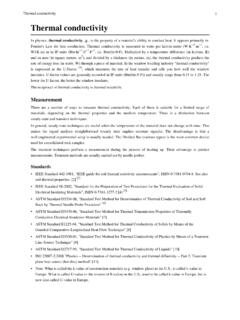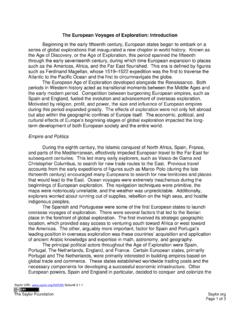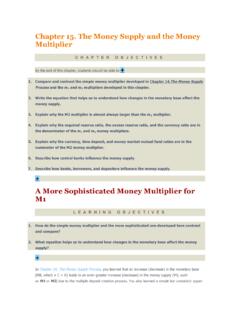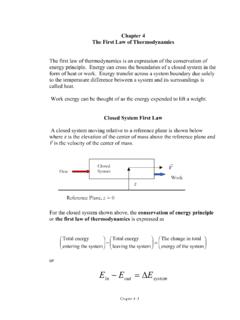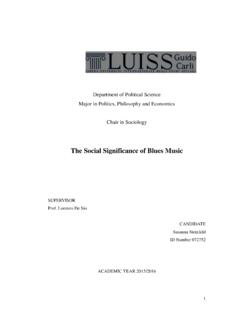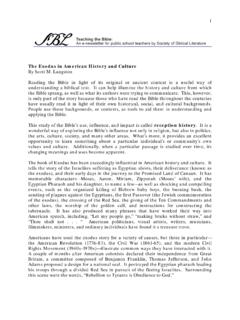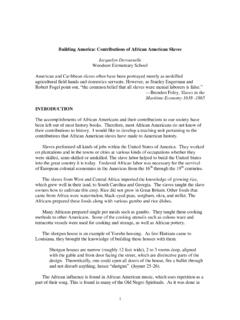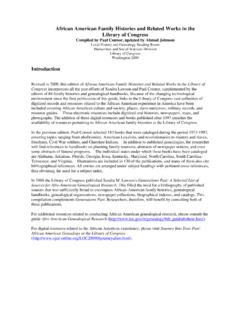Transcription of How Revolutionary Was The American Revolution?
1 Saylor URL: Sub-subunit The Saylor Foundation Page 1 of 2 How Revolutionary Was The American revolution ? The American revolution was a political revolution that separated England s North American colonies from Great Britain and led to the formation of the United States of America. The revolution was achieved in large part by the American Revolutionary War (1775-1783), which was fought between England against America and its allies (France, Spain, and the Dutch Republic). The American revolution embodied and reflected the principles of the Enlightenment, which emphasized personal liberty and freedom from tyranny among other ideals. The American revolutionaries and the Founding Fathers of the United States sought to create a nation without the shackles of the rigid social hierarchy that existed in Europe.
2 Although the American revolution succeeded in establishing a new nation that was built on the principles of personal freedom and democracy, scholars today continue to debate whether or not the American revolution was truly all that Revolutionary . Social and Ideological Effects of the American revolution On the one hand, the American revolution was not a complete social revolution such as the French revolution in 1789 or the Russian revolution in 1917. The American revolution did not produce a total upheaval of the previously existing social and institutional structures. It also did not replace the old powers of authority with a new social group or class. On the other hand, for most American colonists fighting for independence, the American revolution represented fundamental social change in addition to political change.
3 The ideological backdrop for the revolution was based on the concept of replacing older forms of feudal-type relationships with a social structure based on republicanism and democracy. Although today students of the American revolution recognize glaring inconsistencies between what the revolution stood for in theory as opposed to how the United States acted in reality, it is important to recognize the novelty of the principles being espoused during the revolution . The American revolution was responsible for popularizing some of the most radical concepts of the Enlightenment including rule of law, liberty, equality, and a government of the people. In his Pulitzer Prize winning book, The Radicalism of the American revolution , historian Gordon S. Wood argues that the American revolutionaries dedication to making equality one of the most important bedrocks of society was the single most powerful and radical ideological force in all of American history.
4 1 The revolution s ideals of equality and freedom may not have included all segments of society at the nation s inception; however, these Enlightenment principles planted a seed of reform that would continue to grow over the course of America s history. Throughout the nineteenth century, the abolition movement and similar movements against religious intolerance and the subjection of women became 1 Gordon S. Wood, The Radicalism of the American revolution , (New York: Vintage Books, 1991), 234. Saylor URL: Sub-subunit The Saylor Foundation Page 2 of 2 increasingly popular and formidable issues in American society. By the first few decades of the nineteenth century, the northern states had nearly all abolished the institution of slavery or enacted plans for gradual emancipation.
5 Political Effects of the American revolution Politically, the American revolution carried significant and historic consequences. The revolution established a republican form of government out of what had been a monarchical and colonial political system. It altered the position of American people from being subjects of the British crown to citizens and political participants of a republic. It also endowed the middle segments of society with more political agency than they had ever previously experienced under British rule. During the colonial period, only a very small number of white men enjoyed the right to vote. Also, political participation was low. There were very few organized political parties and wealthy merchants, lawyers or planters, held most major political offices. As the American revolution approached and political issues became heated, voter turnout increased.
6 Political pamphleteering and propaganda became more popular and led to an increased knowledge of political events by more of the population. During and after the American revolution , political offices became increasingly elected positions as opposed to governmental appointments. Following the revolution , average Americans began to call for expanded suffrage to include a wider portion of the population. Of course, this political extension of freedom only applied to certain portions of the population and excluded all women, enslaved Africans, freed african Americans, and a large portion of poor white men from participating in the political and even at times the social spheres of society. However, the Revolutionary War led to dramatic changes in the lives of women who were able to exercise political control during the boycott campaigns against British goods.
7 Furthermore, out of necessity, many women contributed to the war effort by running their husband s farms or businesses, while the men were off fighting for independence. Following the war, many American women started to protest against their lack of civil and political rights. Lesson Summary: Scholars continue to debate how Revolutionary the American revolution actually was in comparison to other historical revolutions such as the French revolution or the Russian revolution . Although the American revolution did not result in a complete and total upheaval of the pre-existing social and political infrastructures, the Founding Fathers intended to create an entirely new political framework that was unprecedented for the time period. The Founding Fathers used the principles of the Enlightenment as the basis for the major political documents of the founding of the United States including the US Declaration of Independence, the US Constitution, and the Bill of Rights.
8


